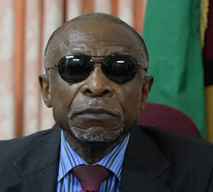The closure of the Trinidadian refinery, Petrotrin has left members of CARICOM, including Guyana, scrambling to find fuel suppliers from outside the region.
Minister of Foreign Affairs Carl Greenidge told a press conference yesterday at Takuba Lodge that the matter was examined at the recent CARICOM prime ministerial sub-committee meeting in Barbados which looked at a couple of options that were available and asked relevant experts and ministers to explore the matter urgently and to advise.
Greenidge noted that in purchasing fuel outside of the Caribbean a 10% Common External Tariff (CET) is applicable as part of the provisions of the Carib-bean Single Market and Economy (CSME) and explained that consideration was being given to removing the CET so as to prevent an increase in prices at the pump.
“There is a recognition that the barriers to importation from elsewhere is partly a fiscal barrier. In other words it arises from the CET and the ministers agreed that, in the circumstances, the Common External Tariff will have to be waived and the other sources will be explored,” he said.
In St Vincent and the Grenadines (SVG) the government of Prime Minister Ralph Gonsalves has already given provisional approval for the waiver of the CET to its two fuel distribution companies.
A report by Vincentian news agency Searchlight indicated that Gonsalves announced to parliament on September 6 that an application had been made to CARICOM for official approval.
“Of course, we informed the Secretary General of CARICOM that there would be a formal application, but that application will normally take between two to three weeks to be processed, but countries can’t wait on that period of time and certainly not in the case of St Vincent and the Grenadines where these purchasers don’t have storage capacity for beyond a three-week period or thereabout so that it’s a very important decision which was taken by Cabinet,” the Prime Minister is reported as saying.
Greenidge also said that Guyana’s “own storage capacity is relatively limited” stressing that CARICOM leaders are required to deal with the supply of fuels with “urgency” though no time frame was set.
“No time frame was set. Urgency was required so I don’t think it was necessary. They just know they have to come back quickly. There is not to be a delay arising from what would normally be required, namely COTED (Council for Trade and Economic Development) and CET. That would not be a constraint,” he said.
He added that governments were considering purchasing from the United States or fuel storage facilities in Antigua, and Jamaica.
Two weeks ago Trinidadian Prime Minister Keith Rowley announced that the state-owned Petrotrin would be closed.
He told the twin-island nation in an address that the 100- year-old refinery had no reasonable prospect adding that its climbing debt was too much to saddle the country’s taxpayers with.
“Petrotrin was overburdened with debt. The net debt at financial year-end 2015 amounted to TT$11.4 billion,” Rowley said adding that left as it is, Petrotrin will require an immediate TT$25 billion cash injection just to stay alive” and “there is no way that the company can find this money” as “no financier will lend it because the company simply will not be able to repay such an additional loan.”
Since that time Trinidadian Opposition Leader Kamla Persad Bissessar has raised the prospect of Guyana oil being used to rescue the refinery.
Greenidge noted that no formal request had been made for any partnership in that particular area.
He, however indicated that a Framework Agreement and Memorandum of Understanding (MoU) are to be signed between the Governments of Guyana and Trinidad and Tobago.
Despite calls from the Georgetown Chamber of Commerce and Industry for government to delay the signing of any bilateral agreement until Guyana implements local content legislation for the oil sector, Greenidge noted that the MOU would be signed.
He argued that the local discourse appears to have given MoUs more power than they have.
“An MOU and I emphasize, because it seems that the press and those who ought to know better are imbuing MOUs with some magic they do not have… it is not by itself a binding instrument of implementation,” he said.
The minister further explained that an MOU is normally a statement of intent that is signed between two countries which deals with general principles; an understanding that the countries will collaborate on general trade matters or establish a platform at which cooperation will be undertaken.
“Many MoUs are signed and never implemented,” he stressed adding that “the MOU in relation to Trinidad and Tobago and the Framework Agreement are no different from any of the others. As a matter of fact as we have indicated before in 1999 the Governments of those two countries signed an MOU. It was a 10-year MOU. It was signed and no riot occurred, no sector was destroyed, there was no apocalypse. And I am sure that this won’t happen on this occasion either.”









